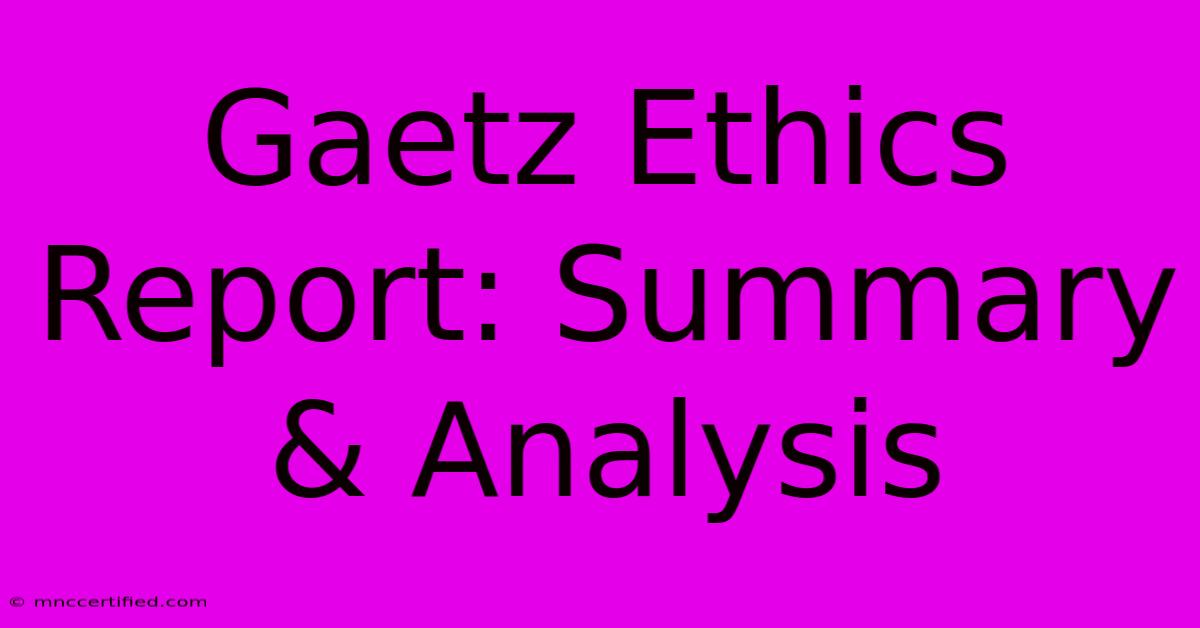Gaetz Ethics Report: Summary & Analysis

Table of Contents
Gaetz Ethics Report: Summary & Analysis
The House Ethics Committee's investigation into Representative Matt Gaetz remains a subject of intense public scrutiny and debate. While the Committee ultimately decided not to pursue formal charges, the report itself is dense and requires careful analysis to understand its conclusions and implications. This article provides a concise summary and in-depth analysis of the Gaetz ethics report, examining its key findings, limitations, and the ongoing controversies surrounding the case.
Key Findings of the Gaetz Ethics Report
The report, released in [Insert Date of Report Release], focused on several allegations against Rep. Gaetz, including:
-
Allegations of sexual misconduct: The report investigated claims of Rep. Gaetz engaging in sexual relationships with underage individuals and paying for sex. The Committee examined witness testimony, financial records, and communications data. While the report acknowledges the seriousness of these allegations and details numerous interviews and investigations, it ultimately found insufficient evidence to substantiate these claims beyond a reasonable doubt. This is a crucial distinction – the lack of sufficient evidence for formal charges does not equate to a finding of innocence.
-
Allegations of misuse of campaign funds: The report also explored whether Rep. Gaetz misused campaign funds for personal expenses, including potentially using them to facilitate sexual encounters. This investigation involved scrutiny of campaign finance records and associated documentation. Similar to the sexual misconduct allegations, the Committee concluded there was insufficient evidence to support formal charges. However, the report may suggest areas where campaign finance laws could be improved to address similar situations in the future.
-
Allegations of obstruction of justice: This element of the investigation explored whether Rep. Gaetz attempted to obstruct the Committee's investigation itself. This involved examining communications and actions taken by Rep. Gaetz and his associates. The report did not find sufficient evidence to conclude obstruction of justice had occurred.
Analysis of the Report's Limitations and Criticisms
While the report concluded with no formal charges, several aspects have drawn criticism:
-
Lack of transparency: Critics have argued that the report lacked sufficient transparency, with limited details released publicly about the evidence considered and the reasoning behind the Committee's conclusions. This lack of transparency fuels speculation and distrust.
-
Witness credibility: The report's findings were heavily reliant on witness testimony, some of which may have been contradictory or potentially unreliable. This raises concerns about the reliability of the evidence considered.
-
Scope of the investigation: The investigation's scope and timeline have also faced scrutiny. Some argue that the investigation was not thorough enough or that key witnesses were not adequately interviewed. This leaves room for unanswered questions and persistent speculation.
-
Political considerations: Given the highly partisan political climate, accusations of political bias in the investigation's conduct and outcome have been made by both sides of the political spectrum. The very nature of the ethics process inherently opens it up to such criticism.
Ongoing Controversies and Future Implications
Despite the Committee's decision, the allegations against Rep. Gaetz continue to cast a shadow over his career and the Republican Party. The report itself, even without formal charges, has had a lasting impact:
-
Reputational damage: The allegations, even if not formally proven, have undoubtedly damaged Rep. Gaetz's public image and credibility.
-
Legal ramifications: While the House Ethics Committee did not pursue formal charges, this does not preclude the possibility of future legal action, either civil or criminal, based on the same allegations.
-
Ethical standards in Congress: The case highlights ongoing debates about ethical standards and transparency within Congress, raising questions about whether current rules and procedures are sufficient to address such serious allegations.
Conclusion: A Case of Insufficient Evidence, Not Innocence
The Gaetz ethics report ultimately concluded with a lack of sufficient evidence to justify formal charges. This is a significant legal distinction. While the report does not exonerate Rep. Gaetz, the lack of concrete evidence leaves lingering questions and ambiguities. The report's limitations, including concerns about transparency and witness credibility, only further intensify the debate surrounding the case and its wider implications for ethical conduct within Congress. This complex case serves as a reminder of the challenges in investigating such sensitive allegations within a politically charged environment.

Thank you for visiting our website wich cover about Gaetz Ethics Report: Summary & Analysis. We hope the information provided has been useful to you. Feel free to contact us if you have any questions or need further assistance. See you next time and dont miss to bookmark.
Featured Posts
-
Sexual Misconduct Allegations House Report
Dec 24, 2024
-
Find Santa In Glasgow 2024
Dec 24, 2024
-
Festivus The Seinfeld Holiday Explained
Dec 24, 2024
-
Dundee Crocodile Burt Dead
Dec 24, 2024
-
Honda Nissan Merger Cantons Response
Dec 24, 2024